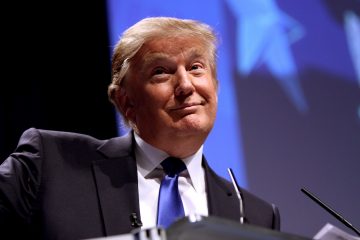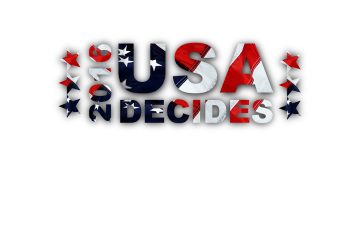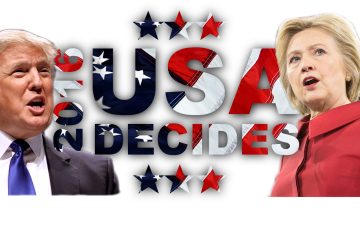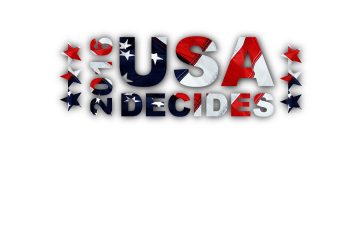
Trump has given a face to the ‘invisible hand’
What Trump may not realise, however, is that he is in fact dealing the deadliest blow so far to the neoliberal order that he feeds on. In electing Donald Trump the forty-fifth president of the United States on 8 November 2016, the American people have in fact voted against Trump and the predatory system he embodies. He may have masterfully exploited the despair of the precariat to his own advantage, yet it is the precariat, the working class struggling with chronic and manifold precarity, that is using him as a weapon against the invisible oppressive hand of neoliberalism that has ravaged the middle class since the late 1970s. Seeing this momentous vote as a motley mix of racism, ignorance and …

TRUMP’S IMPACT ON INTERNATIONAL RELATIONS
It is slowly dawning on us all that Donald Trump was right when he said that the American election day ‘will be Brexit times 10’. In my experience, 4,000 miles across the Atlantic, people looked ten times more shocked when they saw Trump give a victory speech than when it became clear that their country had decided to leave the European Union. Much has been written about Trump’s hateful rhetoric, which has offended 282 people and places on twitter alone, and the possible ramifications of his breaking long-established domestic norms. But it is the global implications of a Trump presidency that worries people across the globe. If he makes true on his campaign promises, we would see a large-scale withdrawal …

What election analysts can learn from Trump’s win
Donald Trump’s presidential election victory has—among many others—upset political commentators. Few predicted the outcome. Most used periodic polling and historical trends to predict that Secretary of State Hillary Clinton would win. Almost every step of the way, from the primaries to election night, there were election analysts who failed to acknowledge Trump as a credible contender. Studies of the electoral map suggested the pathway to the White House was nearly unachievable for Trump. He would need to win all of the big swing states to reach the required 270 Electoral College votes. In the end Clinton won the popular vote but Trump received 290 Electoral College votes compared to Clinton’s 228 – a clear victory. Trump’s triumph has shocked a …

How we correctly predicted a Trump victory
The US election result came as an absolute shock to many, but it was the pollsters that took the biggest hit. The major poll-based forecasts, a lot of models, the prediction markets, even the superforecaster crowd all got it wrong. They estimated high probabilities for a Clinton victory, even though some were more careful than others in claiming that the race would be very tight. Our prediction survey, however, was spot on thanks to the method we used for Oraclum Intelligence Systems, a start-up developed out of our academic work. We predicted a Trump victory, and we called all the major swing states in his favour: Pennsylvania (which no single pollster gave to him), Florida, North Carolina, and Ohio. We gave Virginia, Nevada, Colorado, and …

A political earthquake with few US precedents
The election of Donald Trump is a political earthquake with few direct precedents. Andrew Jackson’s election as a populist in 1832 is one possibility. As a novice to elected office, President Eisenhower’s election in 1952 has that in common but little else. Ideologically, Trump’s radical reforms permit a loose analogy with Ronald Reagan’s agenda in 1980, but President Reagan was an outward-looking and internationally engaged White House incumbent. Trump is decidedly inward looking and isolationist. His conversion into a normal presidential candidate has been remarkable. Trump’s intelligence and knowledge of the world of social media and TV entertainment gave him a major advantage during the Republican presidential primaries and then the election campaign. Both in the state primary appearances and …

What to make of the US Election Forecasts
The majority of forecasts point to Hilary Clinton winning tomorrow’s US presidential election. Several of the poll, market and expert forecasts with probabilities for who will win are helpfully summarised by the New York Times here. The polls-based predictions are all, apart from one, pretty confident that Clinton will win. At the time of writing, Drew Linzer’s model at Daily Kos puts the probability of a Clinton win at 87%, HuffPost has 98% and Sam Wang at the Princeton Election Consortium estimate is as high as 99%. The New York Times’ own model is slightly less confident, on 84%. The exception is Nate Silver’s FiveThirtyEight model which puts Clinton’s chances at just 67%. The lower probability for Clinton in the FiveThirtyEight model …

America’s Other Vote: Cannabis Legalisation on the Ballot
Casual observers and the millions who have tuned in to watch the Presidential debates might be unaware of the other important vote taking place tomorrow: cannabis legalisation. While the omission of any question on climate change during the three Presidential debates garnered widespread attention, the legislation of this soft drug was the second major absentee in the televised clash between Hilary Clinton and Donald Trump. On November 8th, US citizens will not only elect a new President; initiatives to legalise recreational cannabis are also on the ballot in five states. There is a good chance that disappointed Trump or Clinton supporters will be able to drown their sorrows with legal marijuana in California, Nevada, Massachusetts, Arizona and Maine. The map …

Trumped-up vs. Clintonesque: what text analysis can teach us about the US elections
The 2016 United States presidential election—or in John Oliver’s most recent definition: ‘lice-on-a-rat-on-a-horse-corpse-on-fire-2016’—has reached its final leg. As a political scientist and a computational text analyst, I cannot resist sharing my two cents on an election that has certainly broken a model or two. Following in the footsteps of two colleagues who recently produced two excellent articles (you can read them here and here), in this post I’d like to analyse a few examples of the exceptional language used in this elections cycle. Text analysis can help us understand two commonly held beliefs or facts (the distinction has become a bit blurred over the course of this year’s election cycle) about the US elections: Donald Trump is running a negative …









